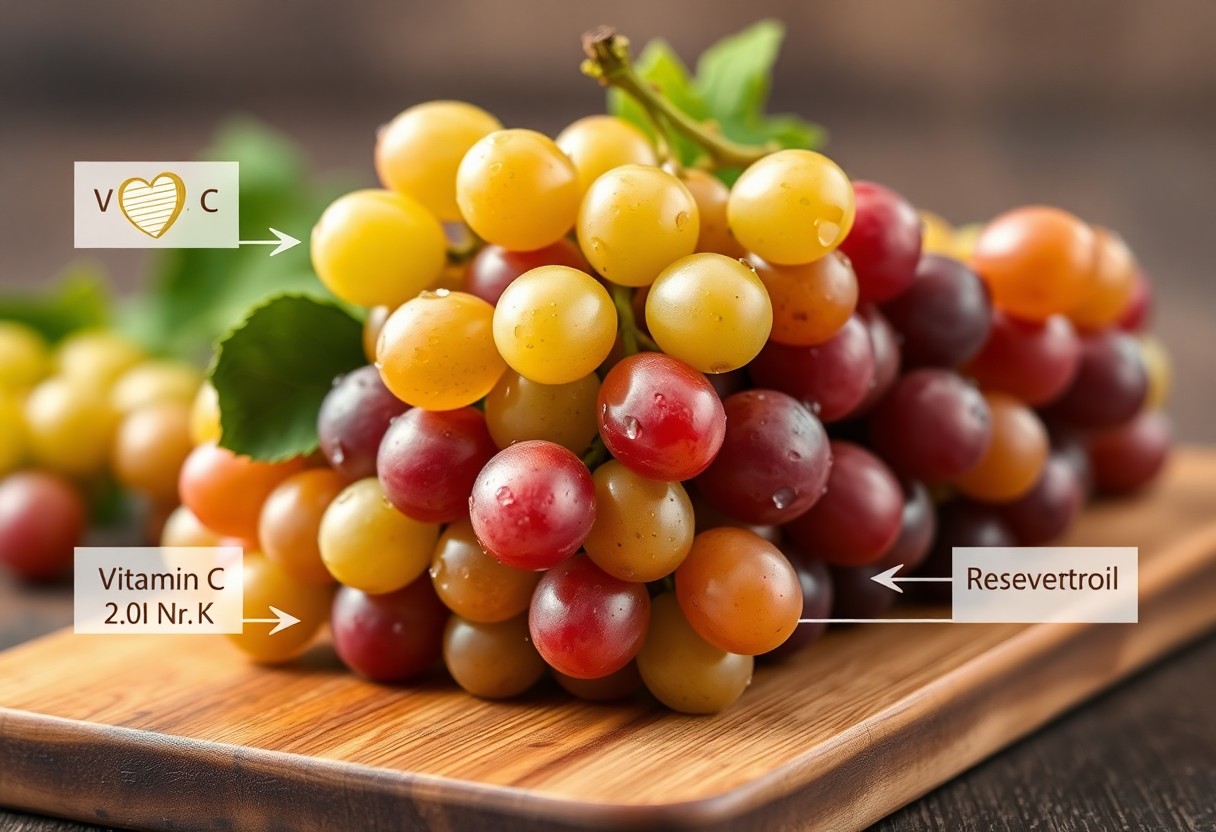Health is enhanced by understanding the nutritional value of grapes, which are packed with necessary vitamins and potent antioxidants. You can benefit from their rich content of vitamin C, vitamin K, and several B vitamins that support various bodily functions. Furthermore, the antioxidants found in grapes, such as resveratrol, can promote heart health and overall well-being. To discover more about the Health Benefits of Green Grapes, this post will guide you through their impressive nutritional profile and benefits.

Key Takeaways:
- Grapes are rich in vitamins C and K, providing important nutrients for the immune system and bone health.
- High in antioxidants such as resveratrol, grapes may help reduce inflammation and support heart health.
- The natural sugars in grapes offer a quick source of energy while their fiber content aids in digestion.
Nutritional Composition of Grapes
The nutritional composition of grapes is impressive, boasting a low-calorie profile with approximately 69 calories per 100 grams. This serving also contains around 17 grams of carbohydrates, primarily from natural sugars, making grapes a quick energy source. Moreover, they offer dietary fiber, which supports digestive health. The combination of low calories and high water content—about 81%—makes grapes an excellent option for hydration while providing necessary nutrients.
Vitamins Present in Grapes
Your intake of vitamins is well-supported by grapes, particularly vitamin C and K. A 100-gram serving delivers 10% of the daily recommended intake for vitamin C, necessary for immune function and skin health. Additionally, vitamin K, vital for bone metabolism and blood clotting, is present in substantial amounts, providing about 18% of your daily needs.
Minerals and Nutritional Profile
Grapes also contribute necessary minerals such as potassium, calcium, and magnesium. A 100-gram serving contains about 191 milligrams of potassium, which plays a role in maintaining healthy blood pressure and cardiovascular function. Calcium and magnesium are present in smaller quantities, but they support bone health and muscle function, making grapes a well-rounded addition to your diet.
In addition to these minerals, grapes contain trace amounts of iron and phosphorus, contributing to overall nutritional balance. Their potassium content aids in regulating fluid balance and muscle contractions, while calcium supports dental health. Given their combination of vitamins and minerals, grapes promote not only hydration but also a range of physiological benefits, making them a nourishing choice for any meal or snack.

Antioxidants in Grapes
Antioxidants play a vital role in your health by combating oxidative stress and reducing inflammation. Grapes, particularly red and purple varieties, boast a high concentration of beneficial antioxidants, including flavonoids and polyphenols. These compounds can enhance your overall well-being, contributing to heart health and potentially lowering the risk of chronic diseases. For a deeper investigate grape nutrition, check out Grape Nutrition: The Good-News Fruit.
Resveratrol
Resveratrol is a standout antioxidant found in grapes, particularly in the skins. It has garnered attention for its potential to promote heart health by improving blood circulation and reducing bad cholesterol levels. Studies suggest that resveratrol may also possess anti-inflammatory and anti-cancer properties, making it a compelling component of a healthy diet.
Other Beneficial Compounds
In addition to resveratrol, grapes contain other important compounds, including flavonoids and tannins, which contribute to their overall health benefits. These compounds work synergistically to enhance your body's defenses, supporting cardiovascular health and offering anti-aging effects.
Other beneficial compounds in grapes, such as anthocyanins and quercetin, further elevate their health-promoting properties. Anthocyanins, responsible for the vibrant colors of red and black grapes, are linked to improved cognitive function and reduced risk of neurodegenerative diseases. Quercetin may help mitigate allergic reactions and reduce cell damage. Including grapes in your diet not only satisfies your sweet tooth but also enriches your health with a variety of protective compounds.Health Benefits of Grapes
Grapes offer a myriad of health benefits, significantly contributing to overall wellness. Their rich nutritional profile, combined with bioactive compounds, makes them a powerful addition to your diet. Regular consumption can enhance heart health, reduce inflammation, and support digestive functions, allowing you to enjoy a healthier lifestyle.
Cardiovascular Health
Incorporating grapes into your diet can promote cardiovascular health by improving blood flow and reducing the risk of heart disease. The polyphenols found in grapes, particularly in red and black varieties, help lower blood pressure and cholesterol levels, making your heart more resilient against various conditions.
Anti-inflammatory Properties
The anti-inflammatory properties of grapes stem from their high levels of antioxidants, which mitigate chronic inflammation in the body. This reduction in inflammation can alleviate symptoms associated with conditions like arthritis and support overall joint health.
Grapes contain compounds such as resveratrol and flavonoids that are particularly effective in lowering inflammation. Studies have demonstrated that these substances can inhibit the production of inflammatory markers in the body, thereby reducing the risk of inflammation-related diseases. Regularly consuming grapes may not only lower acute inflammation but also contribute to long-term health improvements, enhancing your quality of life.
Support for Healthy Digestion
Grapes are a valuable ally for maintaining healthy digestion due to their high fiber content. Fiber aids in promoting regular bowel movements and preventing constipation, helping you maintain a comfortable and efficient digestive process.
The natural sugars and fiber in grapes can also support a healthy gut microbiome. A balanced microbiome is vital for digestion and nutrient absorption, and the prebiotic effects of fiber assist in feeding beneficial gut bacteria. Additionally, the hydration from grapes, being water-rich, can facilitate smoother digestion, ensuring your gastrointestinal system functions optimally.
Grapes and Weight Management
Low-Calorie Snack
Grapes are a delicious, low-calorie option for satisfying your sweet tooth while managing your weight. With about 62 calories per cup, they provide a smart snack alternative compared to sugary treats. Their high water content (approximately 81%) helps you feel full, reducing the chances of overeating. Incorporating grapes into your diet can enhance your intake of fiber, which aids digestion and promotes satiety, making it easier for you to maintain a healthy weight.
Incorporating Grapes into Your Diet
Fresh and Whole
Enjoying grapes fresh is one of the best ways to reap their nutritional benefits. A single cup contains about 104 calories and is packed with vitamins C and K, making them a perfect snack. Toss a handful into your morning yogurt or oatmeal for added sweetness and texture.
Creative Uses
Add grapes to salads for a burst of flavor and color. They pair well with mixed greens, nuts, and cheese. Roasted grapes can also enhance savory dishes, bringing a unique sweetness to meats and vegetables. For a quick treat, freeze grapes for a refreshing snack on hot days.
Juices and Smoothies
Blending grapes into smoothies or juices maximizes their health benefits. A smoothie with spinach, bananas, and a cup of grapes can provide an antioxidant-rich meal replacement that supports your immune system and boosts energy levels. Aim for at least a cup of grapes in your weekly diet for optimal health advantages.
Final Words
Considering all points, incorporating grapes into your diet can significantly enhance your overall health due to their rich nutritional profile. You benefit from necessary vitamins, powerful antioxidants, and various health advantages, such as improved heart health and enhanced immune function. By enjoying grapes regularly, you embrace a delicious way to support your well-being, helping you maintain a balanced and nutrient-rich lifestyle.
FAQ
Q: What vitamins are found in grapes?
A: Grapes are rich in vitamins C and K. Vitamin C supports the immune system and skin health, while vitamin K is important for bone health and blood clotting.
Q: How do antioxidants in grapes benefit health?
A: Antioxidants in grapes, such as resveratrol and flavonoids, help protect cells from oxidative stress, reduce inflammation, and lower the risk of chronic diseases like heart disease and cancer.
Q: Are grapes good for hydration?
A: Yes, grapes have a high water content, approximately 81%, making them an excellent choice for hydration while also providing vital nutrients.
Q: What health benefits are associated with eating grapes?
A: Eating grapes may support heart health, improve brain function, aid in weight management, and potentially lower blood sugar levels due to their fiber content.
Q: How can grapes fit into a balanced diet?
A: Grapes can be consumed fresh, dried as raisins, or added to salads, smoothies, and desserts, making them a versatile and nutritious snack option in a balanced diet.

0 Comments